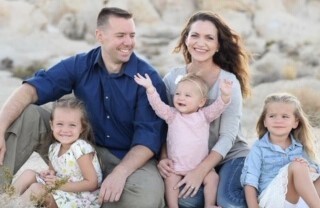“I feel like I am constantly living in an alternate universe.”
It’s a thought that enters Alaira Packard’s mind every time her three young daughters pull out old family albums, which depict a life that sharply contrasts the one they now live. Loss has a way of cutting straight through someone’s life, dividing it into two distinct eras. For Alaira and her daughters, their second “era” began three years ago when her husband, Jake, ended his own life after a long battle with PTSD.
Living with PTSD
When Jake proposed to Alaira, Alaira’s response was two-fold: “Yes…and no.” Yes, she wanted to marry him, but no, not then. Jake was about to be deployed to Iraq, and Alaira wanted to wait until he was home to get married. However, soon after arriving in Iraq, Jake was hit by a roadside bomb while in a striker driver. Three days later he woke up from a medically-induced coma.
Jake returned home, and not long after, he and Alaira were married Logan Temple. Though Jake recovered from his physical wounds, unbeknownst to him or his new bride, the blast left a psychic scarring that affected the rest of his life. Looking back, Alaira recognizes that Jake struggled with PTSD starting as early as the day he woke up from his coma, but at the time they thought he was fine.
“The way the military saw it was, if you weren’t drinking daily or if you weren’t so angry you were beating up your family, you were considered okay. [I thought], ‘Jake has some struggles, but he’s not doing those things, so he must be okay,” Alaira says.
But in many ways, Jake wasn’t okay. At the start of their marriage, he struggled with outbursts of anger, throwing items against the wall and breaking gaming consoles. Over time, those outbursts subsided, but Jake’s anger remained, simmering beneath the surface.
“With PTSD, you kind of don’t know how they are going to react on any given day. A lot of the time it was like walking on eggshells,” she remembers.
Despite this, Alaira and Jake moved forward together, and soon Alaira gave birth to their first daughter. It was then that Alaira started thinking that maybe Jake’s behavior was more than just a bad temper. Though Jake wasn’t physically abusive or violent, he struggled in other ways, suffering from bad dreams and grappling with a deep sense that he wasn’t living the life he was meant to. He had survivor’s guilt, feeling guilty that he survived the bomb in Iraq when others didn’t. He found ways to escape reality—Alaira remembers “he was not really present”— and spent much of his time in solitude. Even his young daughters could sense something was wrong.
“There was this one day that [my daughter] asked if we could go on a walk, and she said, ‘It’s just going to be us because Dad’s not going to come with us anyway.’ She was 3. Even at her young age she was aware that there was something a little bit different with Dad. Those little things add up over time,” Alaira says.
And the little things did add up—so much so that one day, when Jake was angrily talking to his daughters, his brother reprimanded him. Alaira remembers her brother-in-law explaining to Jake that he was overreacting to very simple, childish things. “It wasn’t until then that Jake started realizing [his PTSD] was getting really bad,” Alaira says.
Worried that if the military knew he had PTSD that it would limit Jake’s military career opportunities, he and Alaira decided to go to a confidential, non-medical counseling service offered through the military instead of a behavioral clinic. Unfortunately, for reasons Alaira can only guess now, Jake walked away feeling more depressed and discouraged.
Just a month after meeting with the counselor, seemingly overwhelmed with negative feelings about himself and his actions, Jake took his own life.
“I wish he could have seen that the brain is malleable. You can recover from those things. But I think—I think he just felt like it was a pointless effort to do that,” Alaira says.
Understanding Suicide
“The months after someone dies are very strange,” Alaira explains. “You are kind of overwhelmed with so many things that you don’t really have time to grieve. For months I was just sort of going through the motions of life.”
Jake’s funeral was particularly difficult. Though Alaira wanted she and Jake’s Bishop to speak at the funeral, because of Jake’s military status, a chaplain spoke instead. But when he said outright that her husband would go to hell because of his suicide, Alaira was rattled.
“He just kept going on and on and I was in so much shock that I didn’t know what to do. I wanted to get up there and tell him to stop, but I was frozen,” Alaira remembers. “Since then, I’ve been able to find my voice and speak up when people say things like that.” Despite this difficult experience, she is grateful for Church resources that bring comfort and understanding to people like Alaira, who are trying to grasp where suicide fits in a gospel that preaches the value of life and personal accountability.
In the video “Grieving after a Suicide,” Dale G. Renlund says, “When someone takes their own life, only God is able to judge their thoughts, their actions, and their level of accountability. Suicide need not be the defining characteristic of an individual’s eternal life.”
This statement helped Alaira begin to make sense of what her husband Jake might have been going through and was validated recently when she was talking to a friend who had attempted suicide. This friend explained to Alaira that during that time, she didn’t feel like herself. All she saw was darkness, and she couldn’t see another way out. Understanding this, Alaira now refers to her husband’s death by saying he “died by suicide” rather than “committing suicide,” comparing his death to someone dying by cancer because, as Alaira believes, both are illnesses that, to an extent, can be out of one’s control. Alaira isn’t alone in this understanding. Suicide Prevention organizations also encourage a different way of talking about suicide, and the Associated Press Style Guide now advises news outlets to use phrases like “die by suicide,” “took her own life,” or “killed himself” instead of “committed suicide.”
“I honestly do believe that Heavenly Father judges our hearts as well as our minds. And because of that, [I believe that] if your mind is already not healthy and strong as it should be, Heavenly Father is going to take that into account,” Alaira says.
She founds her opinion partially in statements like this one from Elder M. Russell Ballard:
“Suicide is a sin—a very grievous one, yet the Lord will not judge the person who commits that sin strictly by the act itself. The Lord will look at that person’s circumstances and the degree of his accountability at the time of the act. Of course, this gives us no reason to excuse ourselves in committing sins, nor will the Lord excuse us, if I understand correctly. We must constantly strive to do our best in emulating the Savior in every aspect of our lives. At the same time, however, let us remember that spiritual growth comes ‘line upon line,’ that the key—in the spirit world as well as in mortality—is to keep progressing along the right path.”
Alaira believes Jake is on the other side recovering and learning what he needs to in order to progress. And on this side she too is doing her best to progress “line upon line.”
Regaining Trust in God
Before Jake’s death, Alaira had prayed that Jake would find peace. After Jake’s death, Alaira felt God had failed to answer or protect her and Jake in some way and began wondering if Jake might still be alive if God had done more.
“I definitely had that moment where I could have gone either way—I could have left the Church completely or I was going to submit to the will of the Father and fully immerse myself in the gospel,” Alaira recalls.
She remembers kneeling down as she faced this crossroads and choosing to believe in God. The sense of overwhelming peace was answer enough to her heartbroken prayer: God existed. He loved her, and He would make all things right if she trusted in Him.
Another pivotal moment for Alaira’s faith came a few months after Jake’s death. After days of praying to feel her husband’s presence and feeling nothing, she went to the temple in frustration. While there, however, instead of praying that she would feel Jake, she prayed that she would feel comforted. Again, her Father answered her prayer almost immediately. As she sat in the celestial room “fully aware of my solitude and aloneness,” a woman approached her and said, “I don’t know why, but I just want to tell you that you are loved and I hope you have a great day.”
“She left and I just started bawling because that’s all I wanted. I wanted somebody there with me,” Alaira says. Later, Alaira found the woman in the dressing room and told her story. The woman started crying and said, “I don’t know why, but I had this overwhelming feeling of love for you when I saw you sitting there, and I heard someone say to go to her and tell her that she is loved.”
That experience testified to Alaira that God knew her personally and understood the pain she was experiencing.
“From that moment forward I was like, ‘Okay, if God is there with me I can do anything. I can do this,’” Alaira says.
Processing Loss
The “stages of grief”—denial, guilt, anger, depression, acceptance—often make the grieving process seem like a clear-cut progression from point A to point B. But Alaira, like many others who grieve, wove in and out of these emotions, spending much of her time at the beginning in anger and guilt.
“When it comes to suicide, the only people I can blame are myself and him. That’s difficult because you want to love them and mourn them, but you’re also mad at them,” Alaira says.
Anger and guilt seemed constant companions for Alaira. Often the two emotions fed into each other in a vicious cycle: Alaira would feel guilt for being so angry, and then angry that she felt so guilty. Alaira would even feel guilt for being happy, knowing that her husband wasn’t there to experience that happiness with her. But it seemed the more Alaira fought her feelings, the worse they became. It wasn’t until she allowed herself to feel those full range of emotions that she found relief.
“It’s okay to be mad at [the person who has left you]—they will be okay if we are mad. I’m pretty sure they understand why we are angry,” she says. “When I allow myself to feel those things, I find that I am able to move past that [anger] way faster than if I was just to allow it to fester.”
But even now, three years later, Alaira still gets angry from time to time, especially during major life events. Recently their daughter, who was 5 years old when Jake died, was baptized. Though Alaira believes Jake was there in spirit, Alaira still felt a little bit angry that Jake wasn’t there in person performing the baptism himself.
“I wish he could see their struggle they still have. …I am more angry about the loss for them than the loss for me,” Alaira says, tearing up.
At the baptism, Alaira allowed herself to feel anger and sadness for a few moments, even praying to God and sharing her feelings. She learned long ago that experiencing these feelings were all an important part of grieving, and that it was only by going through those emotions that she was able to get to the other side of them.
“Being angry at them is part of the process, but so is forgiveness,” Alaira says.
Over time, Alaira discovered that her sadness, anger, even happiness were fleeting. However, joy could, as she says, “stay with you forever.” It was something she could choose, especially because for her joy was more than a feeling—it was a way of being.
“Joy, for me, is the Holy Ghost changing my heart,” she says, later adding that her change of heart and joy comes from Christ and “being willing to submit to this life and whatever happens in this life.”
Choosing joy, even amid her grief, allows her to continue experiencing the sadness of her loss but also be grateful for the life that she had with her husband.
“Eventually, it was possible to hear a song on the radio and cry about him and still feel joy in my heart for life and for living and for what we did have together,” Alaira says—a blessing that she feels is only possible because of great support from family, friends, and her Savior.
Moving Forward
Every step forward after the loss of a spouse is a difficult one because every step forward can feel like another step removed from the ones we’ve loved and lost. But Alaira doesn’t see her progression forward as moving on and away from her past—she takes her past with her.
“To me, ‘moving on’ is [that] you’re leaving the past behind you, you’re letting it all go. But by moving forward I’m able to bring my past with me. It’s a friend of mine,” Alaira says. “[Jake] is still a part of my life, especially where we believe in the hereafter. He is still around. To ‘move on’ from him would be silly.”

Another part of “moving forward” for Alaira has included remarrying. Remarriage after the loss of a spouse stirs up all sorts of reactions and feelings from outsiders, with some feeling that remarriage is a result of the widow being needy, or that remarriage is a betrayal of the first spouse. Alaira often says that she didn’t get married because she needs a new husband, she got married because she wanted Jay in her life. They are both clear that Jay doesn’t take the place of Jake—she will always love and grieve the loss of her first husband. Rather, when she remarried, Alaira’s heart expanded, almost like a mother who has a second child; one love didn’t replace the other.
For Alaira, every step forward she takes is a step toward Jake, not away, as she and her current family strive to become more like Christ and return to live “together forever.” For that reason, Alaira doesn’t mind when her daughters take out old family photos to show their step-sisters pictures from their previous life, even if it can feel strange at times to see the contrast between then and now.
“But I feel like when we do those things, we are bringing him with us in this new life, and that feels good,” she says. “That feels like the way it is supposed to be.”
Photos courtesy of Alaira Packard


